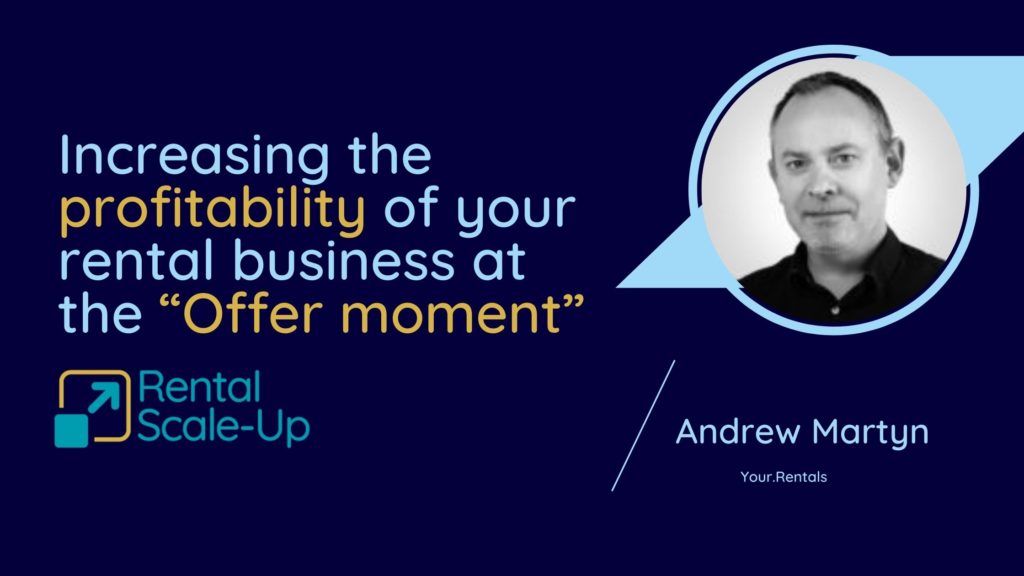Growing profitability for your rental business starts with increasing occupancy while selling nights for the highest price possible.
One critical point in selling more nights is achieving a better conversion rate at the point the guest decides whether to book your property or not – let’s call it the “offer moment.”
This article discusses one way to increase your conversion rate at this critical point and maximize the nightly rate you receive for each booking. And you might be surprised to learn that many of your competitors don’t know about this!
What Booking Options do different OTAs support?

In most online booking scenarios (both OTA and direct booking), the guest will receive one offer from the host or property manager – one price combined with one cancellation policy – take it or leave it. This is quite different from a normal human sales process, where the seller might seek to understand the buyer’s needs and be prepared to negotiate to balance each party’s needs. The guest’s needs might vary regarding cancellation flexibility (i.e., the terms, should they need to cancel) and price. A host or property manager may be willing to negotiate on these points, for example, by increasing the price for greater cancellation flexibility or even offering more flexibility at the same price in off-peak periods.
So why is this process not replicated in online short-term rental sales? Well, it can be! In fact, some OTAs are further ahead than others. Let’s take a look at how they differ.
Most channels allow the guest to use search filters, such as “Cancellation flexibility” to narrow down their search to properties that meet their needs. This means that the properties whose hosts cannot meet the guest’s “Cancellation flexibility” need are filtered out in the search results. This is handy for guests but does not provide hosts or property managers the ability to negotiate at the offer moment.
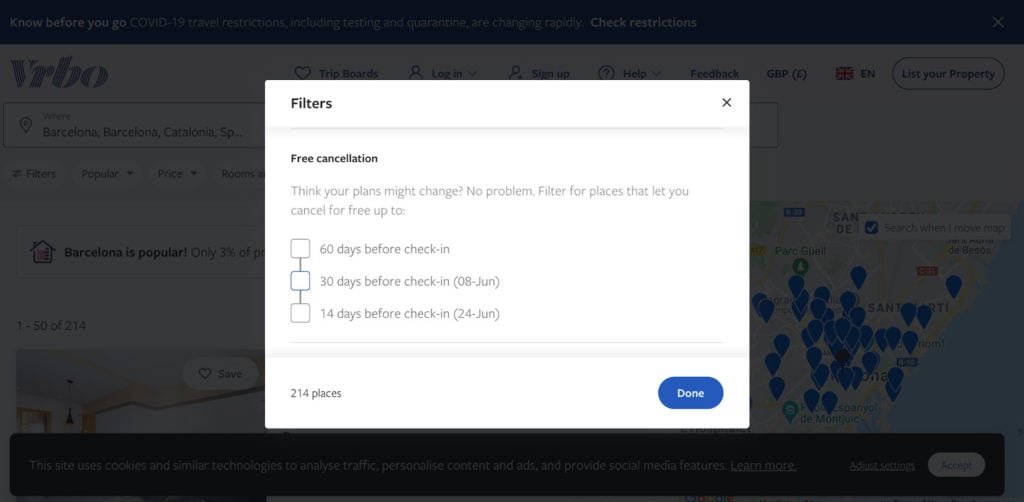
In comparison, some channels do provide guests with multiple options at the time of booking. Airbnb, for instance, allows hosts to add “Non-refundable” as a second cancellation policy to their standard policy. This is, however, not supported by API, so if you use a channel manager, you should check whether that option is available to you.
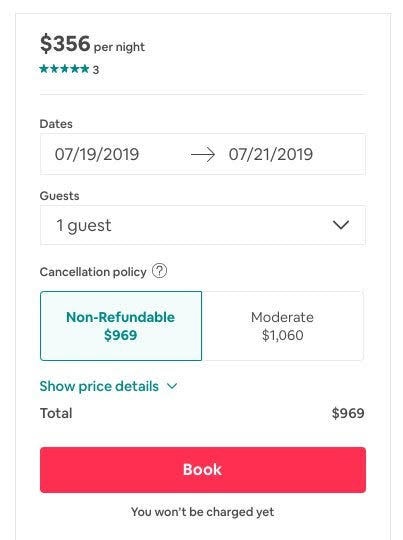
Booking.com also provides the guest with search filters and allows hosts and property managers to set up “Rate plans” (Expedia has a similar feature). A rate plan could, for example, combine different cancellation policies with different prices – more flexible cancellation for a higher price or more strict cancellation for a lower price. When the guest is at the offer moment, they are provided with a choice.
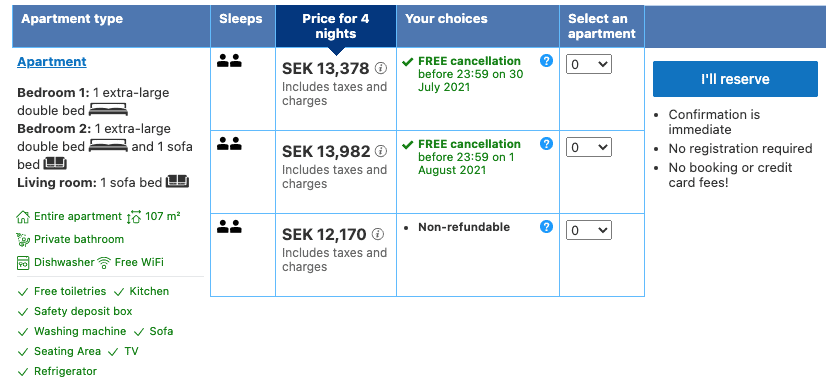
This leads to two benefits. First, hosts and property managers who have defined 2-3 rate plans with different cancellation flexibilities will appear in more search results as they are prepared to meet the needs of different guests. Second, the guest is provided with more choice at the offer moment – pay more for more flexibility or less for a non-refundable booking. Both of these benefits lead to a compounded increase in bookings – more visibility in search results, more property page views, and higher conversion rates at the offer moment.
Multiple Booking Options reduce risk for hosts
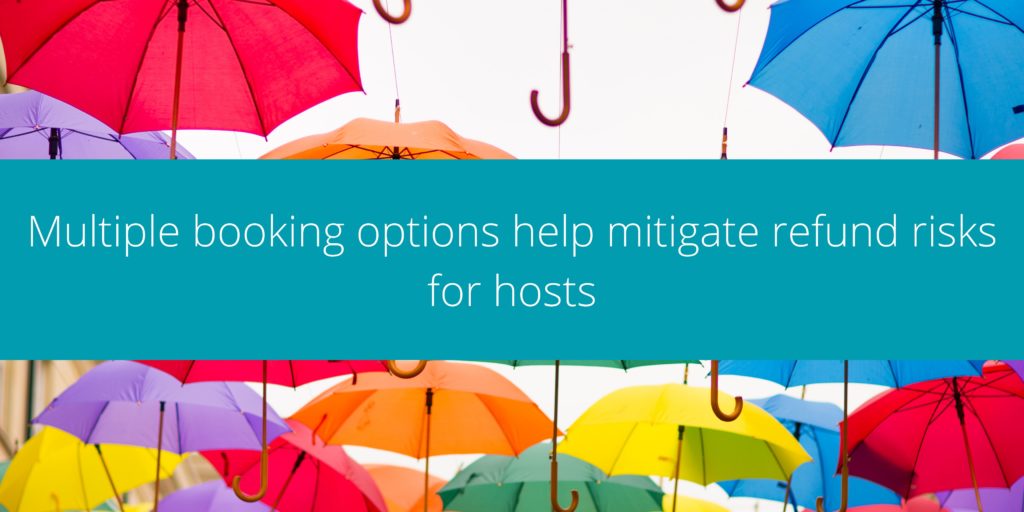
Multiple guest offers also help address another issue – the additional risk that hosts and property managers are being asked to bear.
Since the COVID-19 impact, I’ve discussed with many hosts and property managers the question of risk. Hosts and property managers have felt “forced into,” offering a lot more flexibility.
Guests’ needs have changed towards greater flexibility so dramatically that, at Your.Rentals, we’ve seen during 2021 that properties with Fully refundable policies have been booked 5.2x more often than those with a Partially refundable policy. More fully refundable bookings place a higher risk on the hosts and property managers, who may receive late cancellations with a full refund and a limited chance to replace the booking at short notice. However, in most OTA channels, hosts and property managers must select one cancellation policy at one price level. Allowing multiple rate plans means that the host or property manager can price the risk into their offers. A standard approach is like this:
- Partially refundable (standard) policy – at normal rates
- Fully refundable policy – at a 30% increase to normal rates
- Non-refundable policy – at a 10% decrease to normal rates.
This allows the host or property manager to meet the needs of different types of guests and cover the risk or certainty of revenue by adjusting price levels. The price increase/decrease levels above may vary depending on where your property is located and seasonal demand; however, we recommend these levels as a starting point (based upon the guest cancellation rates of bookings with different policies) to ensure that as a host or property manager, you are profiting from this strategy. We’ve got more info on this here.
Maximise booking conversions by providing Guest Booking Options
At Your.Rentals, we’ve just released our way of helping our customers maximise conversion rates at the offer moment. We call it “Guest booking options” – allowing hosts and property managers to set up to 3 offers, which are sent to OTA channels that support this (currently Booking.com, Expedia, and our Direct booking features). Other OTA channels will receive the best converting offer. We also see a need to apply a seasonal dimension to Guest booking options soon – allowing our hosts and property managers to limit or expand the Guest offers they provide in different seasons.
Due to competitive pressure and the opportunity to sell more bookings, I expect that more OTA channels will soon adopt a similar approach as I’ve described. This is a win-win for both guests and hosts – guests are more likely to book via channels that allow them to select booking options that meet their needs, and hosts will be able to provide more personalised service for each guest and maximise their revenue whilst doing so.
Data shows the more Guest Booking Options available, the higher the conversion rate
Preliminary data on this is very promising. It’s too early to make any definite conclusions, but the initial evidence suggests that listings providing more booking options at the offer moment are booked at a higher rate than those that offer only one. Additionally, guests often don’t book at the lowest price – even when they use price as a filter in their search results. This means that guests are enticed by the possibility of a cheaper booking rate but then opt for a higher price to receive a more flexible cancellation option.
Ultimately, success at the “offer moment” will come down to hosts’ ability to offer the right service at the right price. OTAs and software providers will play a key role in enabling hosts to do this in a simple, user-friendly manner. Getting this right at this crucial time in the industry could have long-term benefits for everyone involved.

